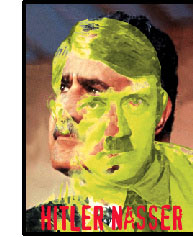

|

|

|

|
|
|
| |
|
|||||
|
Ethics: An Essay on the Understanding of Evil
What, another French intellectual? Another Parisian mandarin bedecked in all the floating signifiers of postmodern significance: the ostentatious knowingness, the oracular pronouncements, the prose that spawns an industry of commentary? After Derrida and Foucault, Baudrillard and Kristeva, Lacan and Irigaray, what difference--or is it differance?--does another pensant make? At a glance, Alain Badiou will seem like all the other Gallic imports. A professor of
But a perusal of Ethics reveals that he isn't quite like his predecessors. Still beholden to the spirit of the May Days, Badiou strikes out in a direction very different from those followed by other soixante-huitards like Andre Glucksmann on the right or Andre Gorz on the left. More like the late Cornelius Castoriadis, or the super-contemporary Slavoj Zizek, Badiou seeks a new moral and political language for the democratic left, one that draws with unabashed facility on classical and religious sources. Badiou writes out of an urgent need to rekindle a revolutionary vision and militance in the face of neoliberalism. Like others on the left (especially in France), Badiou identifies neoliberalism with the swaggering hegemony of the United States, a "democratic totalitarianism" that imposes liberal democracy and unbridled capitalism in the name of universal human rights. The NATO war on Serbia, the sanctions against Iraq, the isolation of Cuba, the creation of NAFTA, GATT and Maastricht--all comprise a bloody and opulent regime of "American imperialism and European servility." This neoliberal imperium rests, not only on the West's economic and military power, but on a technocratic political culture whose contentious surface hides a firm consensus about the supremacy of capital. This "belligerent impotence" characterizes even left-wing parties, tamed and denatured by "disappointment and broken promises." So far, so good--but also fairly uncontroversial, at least on the left. Badiou's provocation begins with his examination and rejection of what he calls "ethics," what we might call the neoliberal moral order. This moral order insists on certain universal and inviolable "rights of man"--the inheritance of the Enlightenment--and on "respect for the Other," a related but only recently emphasized element also known as "difference," "multiculturalism" and so on. Badiou's critique of the "rights of man" as bourgeois ideology is as incisive (and as old) as Marx's. His repudiation of the discourse of "otherness" and "difference" (or what he sometimes calls "culturalism") is more certain to perplex and anger many on the left. He certainly doesn't help his case by adopting the posture of boldness: "I [have] taken the risk of saying frankly something that is uncomfortable to say." Now while "I know it's not p.c. to say this, but ..." can arguably preface a volley against cant, more often it just steals the thrill of heterodoxy for some conventional mite of spleen or bigotry. Still, it's worth remembering that suspicion of "multiculturalism" isn't confined to the right. Terry Eagleton, Todd Gitlin and Russell Jacoby, to cite a few, have noted the obscurantism and intellectual shoddiness of a great deal of talk about "diversity" and "difference." Badiou joins this left chorus of disgruntlement but offers a philosophical alternative that acknowledges and resituates the merits of "otherness." While purporting to "respect difference," the acolytes of otherness are "clearly
Neoliberal ethics also presumes an understanding of evil as pain, suffering and intolerance, epitomized as "radical Evil" in the Nazi extermination of the European Jews. This conception creates three problems for "ethics" in Badiou's view. As evil becomes, in effect, the regulative principle of liberal moral thought, then any collective attempt to achieve justice and freedom--"the Good"--can be stigmatized by association with fascism and Communism. Also, if happiness (defined as prosperity and pleasure) becomes the summum bonum, then any and all attempts to supply it are legitimate--including imperialism. At the same time, the assertion that the Holocaust is "unthinkable and unsayable" removes genocide both from historical explanation and from historical intervention. The fact that the Nazi genocide is also "constantly invoked and compared" (Badiou notes the facile comparisons of Nasser, Saddam and Milosevic to Hitler) renders "radical Evil" even more suspect. "Radical Evil" does more to underwrite Western interests than to foster a genuine consciousness of iniquity. As caustic and over-the-top as Badiou's assertions can be, they counter the ensemble of platitudes about "diversity" and "otherness" that now passes for iconoclasm, not only on the left, but in much of American life. Corporate admakers, university administrators and cultural studies profs now "celebrate diversity." Among students, the incantation of "respect for other cultures" can now make for uneasy silence when an unambiguous condemnation of clitorectomy would be in order. And as Arno Mayer and Peter Novick might agree, the radicalization of evil has imputed an almost sacral aura to the Nazi genocide that resists attempts at historical understanding. You don't have to affirm Badiou's polemical overkill to believe that the lexicon of "difference," "diversity" and "evil" is long overdue for critical reformulation. To this end, Badiou poses an "ethic of truths" against neoliberal "ethics." This ethic of truths is not hostile to differences--the covert reality of liberal "otherness"--but rather is "indifferent to differences." Where the rhetoric of "the Other" disarms revolutionary politics by focusing on "trifling descriptions" of what is, Badiou's ethical discourse of "the Same" both announces "a truth [that] is the same for all" and points toward "what comes to be." Only this recognition of "the Same" can remedy the contemporary world's "incapacity ... to name and strive for a Good." Although "the Good" has marked a distinctly authoritarian lineage in political philosophy from Plato to Leo Strauss, Badiou insists that only this vaguely spiritual conception accounts for the will to emancipation, the allure of reaction and the reality of evil. On all three points Badiou, like Zizek, secularizes ideas derived from theology. Acknowledging his reliance on the letters of St. Paul (the subject of an untranslated book), Badiou contends that the imagination for a new left politics must allow for secular notions of "immortality," "fidelity," "grace" and "evil," all of which flow from a quasi-religious understanding of "truth" and "event." Human beings, Badiou maintains, are "immortal," capable of entering "into the composition and becoming of some eternal truths." "Truth"--an unfolding of human possibility--emerges from "events," unsettling and exhilarating historical episodes that can be neither predicted nor controlled. Those open to the "possibility of the impossible" can extend those events into liberating political movements by their "fidelity" to the revelation. Exemplified in the early Christians, the Jacobins, the Bolsheviks and the Red Guards, revolutionary fidelity calls on its adherents to "seize in your being that which has seized and broken you." To a generation spoonfed on irony, this depiction of revolutionary ontology and commitment might seem romantic at best and frightening at worst. Myself, I don't see how any politics of liberation--from the catacombs of Rome to the streets of Seattle--can get very far without a utopian impulse and zeal. Moreover, Badiou realizes that truth defined in this existential manner can be betrayed,
This formulation goes farther than the banal observation that the Nazis manipulated the German people. Fascism appealed to a venerable longing for community, Badiou implies. If so, then evil, far from being the mere opposite of good, arises out of the deepest and noblest desires of the human heart. But why should truth take any false and murderous form? How does evil happen? Though he doesn't acknowledge it (though I doubt he doesn't know it), Badiou's account of evil resembles that of Saint Augustine. Badiou's definition of evil as a "simulacrum" of truth recalls Augustine's understanding of evil as a "perversion" of good--a notion that, in robbing evil of any primacy, allows and even mandates a politics rooted in truth rather than interest. In fact, shorn of the sexual connotations that obscure its import and power, "perversion" suggests that the truth is, in the end, in our interest, and that it will ultimately set us free. But Augustine, unlike Badiou, maintained that there was something perverse about our own will to truth--not something fragile about the truth itself--that could mislead us so horrifically. "Whence will renewal come to us?" Simone Weil asked in Gravity and Grace. "From the past alone, if we love it." This is the language of tradition, remembrance and devotion--a language spoken with facility and often with fraudulence on the right. Now more than ever, perhaps, the left needs to complement its proficiency in the language of power and ideology with a fluency in the parlance of truth and fidelity. Spoken and written with this graceful zealotry, it would no longer be an empty and conservative irony to observe that the more things change, the more they stay the same. Eugene McCarraher teaches humanities at Villanova University and is the author of Christian Critics: Religion and the Impasse in Modern American Social Thought. He is currently working on The Enchantments of Mammon: Corporate Capitalism and the American Moral Imagination. He can be reached at eugene.mccarraher@villanova.edu.
|




